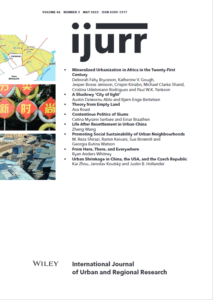Debates over the ontology of contemporary urbanization have questioned the notion of a meaningful ‘outside’ to the urban and have called for greater attention to the socially contested construction of urban subjects and space. Ethnographic study of informal peri-urban agriculture in the rapidly urbanizing city of Chongqing in Southwest China allows for a critical examination of the everyday ecologies and economies of planetary urbanization. The state-led expansion of Chongqing since the early 2000s has created a peri-urban zone consisting of large areas of undeveloped land awaiting construction, which is utilized informally by displaced ‘urbanized’ peasants and migrant workers. The use of this ‘empty’ urban land for agriculture reveals informal practices and displaced subjects which are variously positioned as ‘outside’ or ‘within’ urban systems and values. The undeveloped land remains ecologically entangled with urban processes and is the site of a contested commoning of space which is regarded as external to urban market values. Theorizing from the kongdi (empty land) launches a novel understanding of under-studied urbanizing spaces which are positioned ambiguously outside urban governance, are under threat of rapid enclosure within urban regimes of accumulation, and spatialize the negotiation of the boundaries and meaning of the urban itself.
Highly commended article from 2023
This paper by Asa Roast is a highly contextualised analysis of urban empty land in peripheral Chongqing, China, engaging with the current debates on geographies of temporalities and (planetary) urbanisation. This is an excellent example of a work that is competent in both empirics and theory-building, demonstrating what it is like to theorise from outside the global North. Asa Roast judiciously engages with the findings from his carefully crafted ethnographic fieldwork to reveal how a rapidly urbanised city like Chongqing in China exhibits undeveloped urban land (kongdi in Chinese) that becomes the site of a contested commoning that accommodates informal peri-urban agriculture and raises the questions about the meaning of the urban itself.

